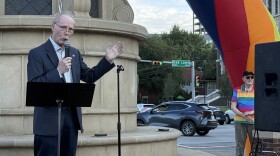Cities in Texas have until the end of the week to remove “non-standard” street markings under a new directive from Gov. Greg Abbott. But neighborhoods that use public art and murals to celebrate their area’s roots are concerned they’ll be most affected.
The biggest targets of the directive in Dallas are the rainbow and “All Black Lives Matter” crosswalks in the Oak Lawn neighborhood and South Dallas.
Democrat Texas Sen. Royce West, who represents South Dallas, said the crosswalks, installed in 2022, are a source of pride.
“It's one continuous drumbeat towards whitewashing history, and also whitewashing (...) cultural issues that are important to different ethnic minority communities,” West said.
Eric Byrd, who’s lived in the area his whole life and owns a retail building by the intersection of Malcom X and Martin Luther King Junior Boulevards, where four of the BLM crosswalks are, said he doesn’t support removing them.
“I mean, it's not an eyesore. It's causing no problem within the community,” Byrd said. “The community likes it, so why are you doing it?”
Byrd said it feels like part of a broader effort to target minorities.
“They’re going to erase some of Black history,” he said. “That's what I feel.”

Abbott’s Oct. 8 directive orders the Texas Department of Transportation “to ensure Texas counties and cities remove any and all political ideologies from our streets.” Federal and state guidelines, the news release said, ban “non-standard surface markings, signage, and signals that do not directly support traffic control or safety ... including the use of symbols, flags, or other markings conveying social, political, or ideological messages."
KERA identified at least 11 street crossings or intersections that could be affected by the governor’s order. Four are in southern Dallas and five are in Oak Lawn. They were funded by private donors or non-profits and used no taxpayer dollars.
The two other designs KERA identified could also fall under the broad language of the directive: a patterned crosswalk on Victory Avenue West, and Southern Methodist University’s mustang logo at the intersection of Hillcrest and Daniel Avenue.
KERA reached out to SMU and University Park for comment but did not receive a response in time for this article.

At a rally in Oak Lawn protesting the Governor’s order, Cece Cox — CEO of Resource Center, a nonprofit that provides health services for LGBTQ communities — said none of the displays should be removed.
“I don't think anybody's gonna argue that those things need to be going away,” Cox said, referring to SMU’s Mustang display. “And we don't believe they should be going away.”
Abbott’s order is identical to a crosswalk ban enforced in Florida earlier this year. Both orders say they follow a July memo from U.S. Transportation Secretary Sean Duffy, who urged governors to remove political messages from streets.
In Florida, the ban was enforced broadly to include removing a “Back the Blue” street mural, painted bike lanes outside an elementary school and a racing-themed crosswalk outside the Daytona International Speedway, according to NBC News.
In Texas, some cities, like Houston, complied with Abbott's order immediately, removing rainbow crosswalks, while others like Austin and San Antonio are currently seeking exemptions.
Dallas City Council is scheduled to discuss pavement marking standards with the city attorney during a closed session this Wednesday. Multiple requests to the city for additional information about compliance with the order were not answered.
Democratic state Rep. Venton Jones, who represents the Dallas area and is one of the first openly gay Black men to serve in the legislature, said the city should be prepared to take legal action.
“We're also looking at legal remedies to be able to continue to fight this in the courts if necessary,” he told KERA.
No matter what decision Dallas makes, it’ll have to spend some money, either on legal fees or removals.
South Dallas resident Eric Byrd said he feels the city should fight back against the order.
“But,” he said, “it might be a fruitless battle.”
Dylan Duke is KERA's Fall news intern. Got a tip? Email Dylan Duke at dduke@kera.org.
KERA News is made possible through the generosity of our members. If you find this reporting valuable, consider making a tax-deductible gift today. Thank you.




